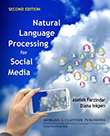Natural Language Processing for Social Media, Second Edition
 Atefeh Farzindar, Diana Inkpen ISBN: 9781681736129 | PDF ISBN: 9781681736136 Hardcover ISBN: 9781681736143 Copyright © 2018 | 195 Pages | Publication Date: December, 2017 |
In recent years, online social networking has revolutionized interpersonal communication. The newer research on language analysis in social media has been increasingly focusing on the latter’s impact on our daily lives, both on a personal and a professional level. Natural language processing (NLP) is one of the most promising avenues for social media data processing. It is a scientific challenge to develop powerful methods and algorithms which extract relevant information from a large volume of data coming from multiple sources and languages in various formats or in free form. We discuss the challenges in analyzing social media texts in contrast with traditional documents.
Research methods in information extraction, automatic categorization and clustering, automatic summarization and indexing, and statistical machine translation need to be adapted to a new kind of data. This book reviews the current research on NLP tools and methods for processing the non-traditional information from social media data that is available in large amounts (big data), and shows how innovative NLP approaches can integrate appropriate linguistic information in various fields such as social media monitoring, healthcare, business intelligence, industry, marketing, and security and defence.
We review the existing evaluation metrics for NLP and social media applications, and the new efforts in evaluation campaigns or shared tasks on new datasets collected from social media. Such tasks are organized by the Association for Computational Linguistics (such as SemEval tasks) or by the National Institute of Standards and Technology via the Text REtrieval Conference (TREC) and the Text Analysis Conference (TAC). In the concluding chapter, we discuss the importance of this dynamic discipline and its great potential for NLP in the coming decade, in the context of changes in mobile technology, cloud computing, virtual reality, and social networking.
In this second edition, we have added information about recent progress in the tasks and applications presented in the first edition. We discuss new methods and their results. The number of research projects and publications that use social media data is constantly increasing due to continuously growing amounts of social media data and the need to automatically process them. We have added 85 new references to the more than 300 references from the first edition. Besides updating each section, we have added a new application (digital marketing) to the section on media monitoring and we have augmented the section on healthcare applications with an extended discussion of recent research on detecting signs of mental illness from social media.
Table of Contents
Preface to the Second Edition
Acknowledgments
Introduction to Social Media Analysis
Linguistic Pre-processing of Social Media Texts
Semantic Analysis of Social Media Texts
Applications of Social Media Text Analysis
Data Collection, Annotation, and Evaluation
Conclusion and Perspectives
Glossary
Bibliography
Authors’ Biographies
Index
About the Author(s)
Atefeh Farzindar, University of Southern California
Dr. Atefeh (Anna) Farzindar is a research associate of the Data Science Institute (DSI) and a faculty member of the Department of Computer Science, Viterbi School of Engineering at the University of Southern California (USC). She received her Ph.D. in Computer Science from the University of Montreal and her Doctorate in automatic summarization of legal documents from Paris-Sorbonne University in 2005.
Diana Inkpen, University of Ottawa
Dr. Diana Inkpen is a Professor at the School of Electrical Engineering and Computer Science at the University of Ottawa, ON, Canada. She obtained her Ph.D. in 2003 from the University of Toronto, Department of Computer Science. She obtained her B. Eng. and M.Sc. from the Department of Computer Science, at the Technical University of Cluj-Napoca, Romania, in 1994 and 1995, respectively. Her research interests and expertise are in natural language processing and artificial intelligence, particularly lexical semantics as applied to near synonyms and nuances of meaning, word and text similarity, classification of texts by emotion and mood, information retrieval from spontaneous speech, information extraction, and detecting signs of mental health problems from social media. Dr. Inkpen was an invited speaker for the Applied NLP track at the 29th Florida Artificial Intelligence Research Society Conference (FLAIRS 2016, Key Largo, FL, May 2016), for the
28th Canadian Conference on Artificial Intelligence (AI 2015, Halifax, NS, June 2015), and International Symposium on Information Management and Big Data (SimBig 2015, Cuzco, Peru, September 2015). She was Program Committee co-chair for the 25th Canadian Conference on Artificial Intelligence (AI 2012, Toronto, Canada, May 2012), for the 7th IEEE International Conference on Natural Language Processing and Knowledge Engineering (IEEE NLP-KE’11, Tokushima, Japan, November 2011), and for the 6th IEEE International Conference on Natural Language Processing and Knowledge Engineering (IEEE NLP-KE’10, Beijing, China, August 2010).